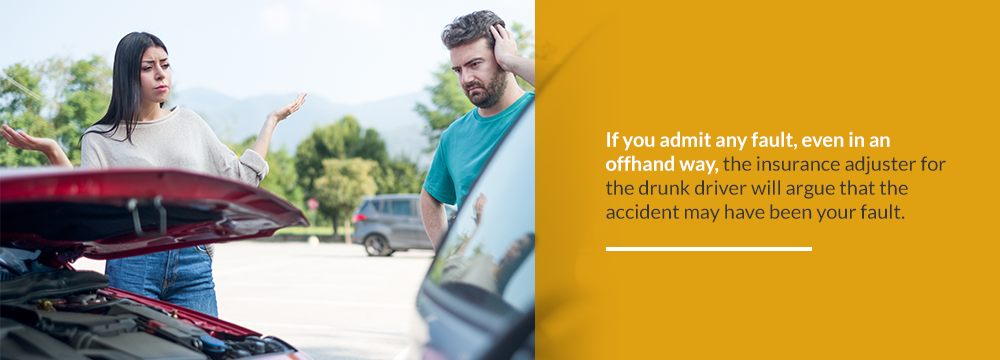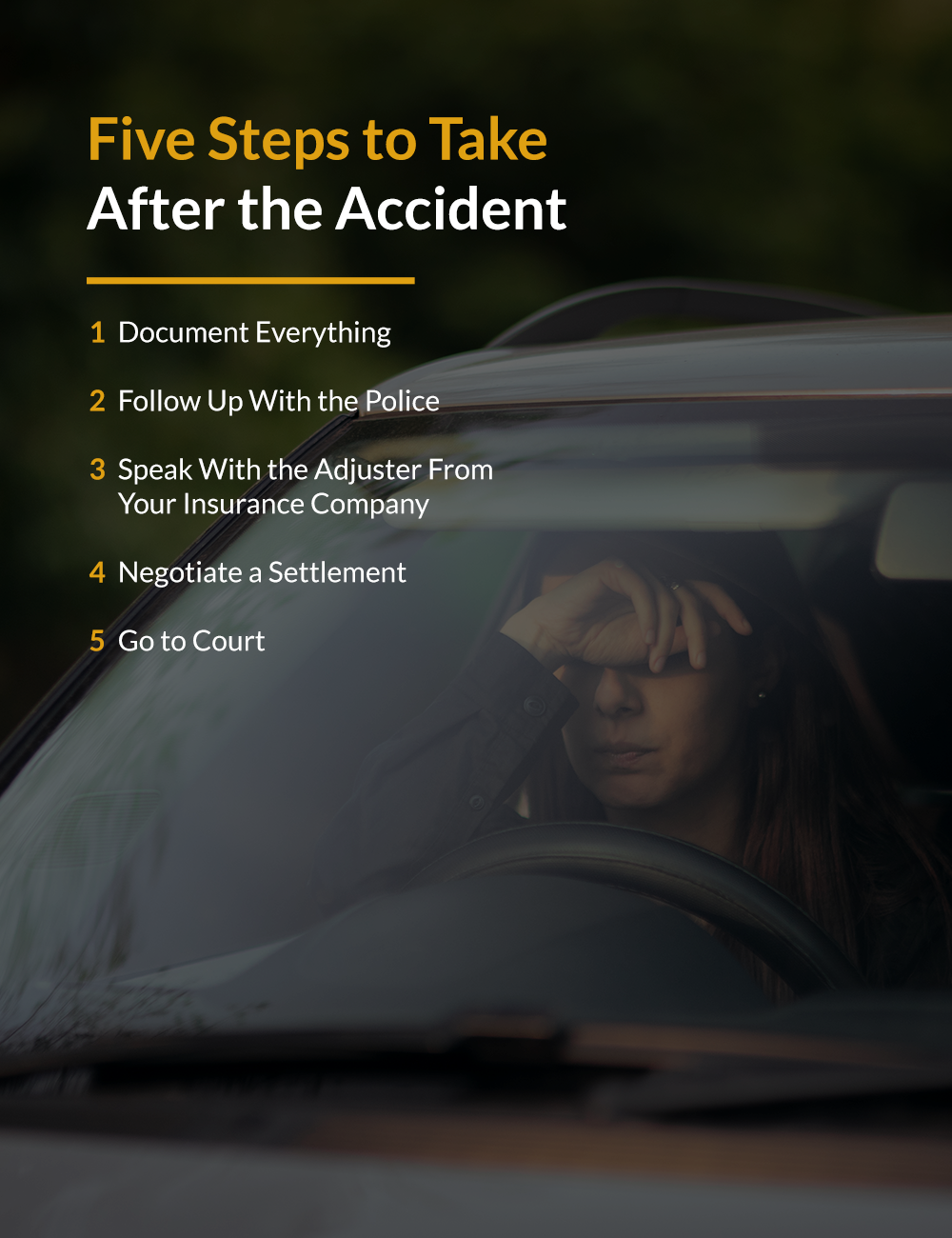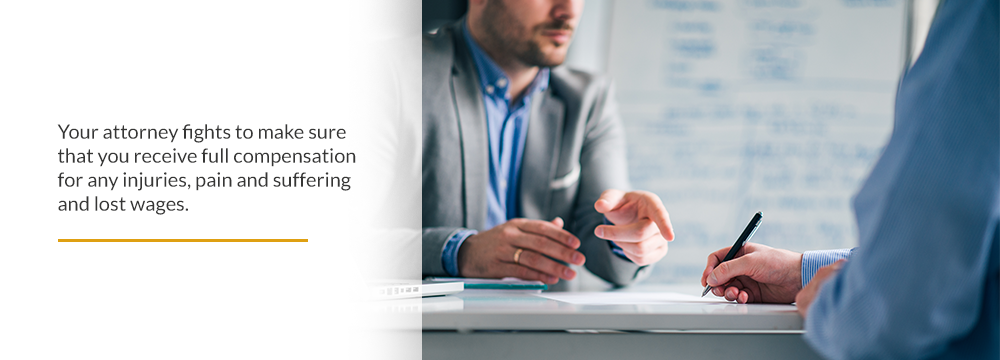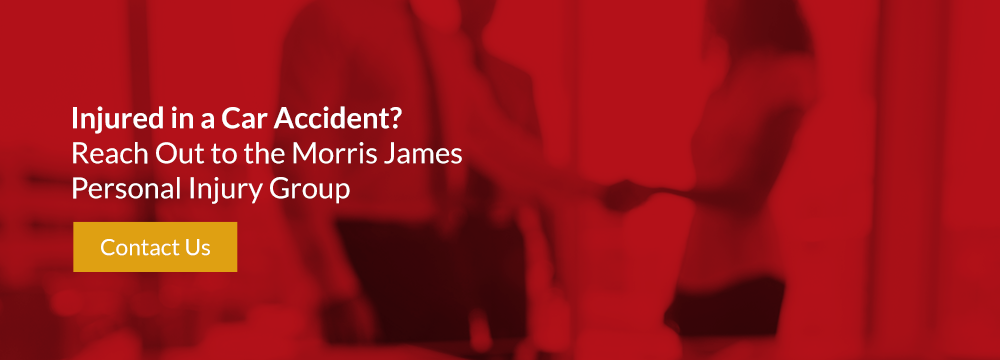What to Do If You Suspect the Person Who Hit You Is Drunk
Drunk driving continues to be a serious problem in the United States. In 2016, police arrested over one million Americans for drunk driving. That is only 1% of the 111 million self-reported incidences of drunk driving. Just over 10,800 people died in alcohol-related crashes in 2017.
Hit By a Drunk Driver
Drunk driving continues to be a serious problem in the United States. In 2016, police arrested over one million Americans for drunk driving. That is only 1% of the 111 million self-reported incidences of drunk driving. Just over 10,800 people died in alcohol-related crashes in 2017.
In Delaware, between 2003 and 2012, 427 people were killed in accidents involving drunk drivers. While the rate of death by age is 3.3 per 100,000 nationally, in Delaware, it is 3.8 per 100,000. Also, in 2012, 2.7% of Delaware residents reported that they drove after excessive drinking during the previous month, almost a full percentage point higher than the national average of 1.9%.
These statistics show that Delaware residents face a significant danger of being hit by a drunk driver. If you've been in an accident with a drunk driver and you been injured, it's perfectly natural for you to expect compensation for damage to your car, for your pain and suffering and for your injuries.
Anyone can get injured in this kind of an accident. Therefore, it's important to know what to do if you have been involved in an accident with a drunk driver.
Signs Of Intoxication After An Accident
Police look for certain signs that indicate a driver may be drunk. These include:
- Weaving in and out of traffic
- Swerving wildly
- Driving 10 miles or more beneath the speed limit
- Using a wide radius to make a turn
- Suddenly stopping in traffic for no reason
- Tailgating
- Signaling erratically
- Driving with no headlights
- Hugging the centerline
There are also signs to look for if you think the driver of the vehicle that hit you is drunk:
- A strong odor of alcohol
- Discarded beer cans or open bottles of wine or liquor in their car
- Stumbling or having trouble standing up straight
- Watery or red eyes
- Trouble concentrating
- Trouble staying awake
- Slurred speech
What to Do at the Scene
Sometimes, the driver that hit your car is obviously intoxicated. At other times, it may be more difficult to tell if they are drunk. Many drivers, particularly older drivers, can look sober when they talk to a police officer.
Whatever the case may be, if you believe a drunk driver hit you, your actions immediately after the accident may significantly impact your chances of negotiating a significant settlement or winning a lawsuit. Here's what you should do right after the accident occurs:
1. Call the Police
Call the police immediately if you've been hit by a suspected drunk driver. By reporting the drunk driving, you fulfill your civic duty. It also documents the accident. This is crucial if you plan to make an insurance claim or file a lawsuit against the drunk driver.
If the accident results in a lawsuit and you need to go to court, the lawyer for the drunk driver will argue that their client was not intoxicated. A police report can help your lawyer construct a case to prove that the other driver was drunk.
2. Provide the Police With Details About the Incident
The investigating officer will ask you for details about the accident. Provide as accurate a description as you can. Do not exaggerate. Do not elaborate beyond the question you are asked. Do not speculate. Give honest, straightforward descriptions about how the crash occurred and what you observed about the other driver.
It is important that you provide the police with details that you observed about the drunk driver. Police may be hesitant to charge a driver with a DUI because it requires so much extra paperwork. Your description of the other driver will play an important role in convincing the police to conduct a sobriety test or take other measures to determine if the other driver is intoxicated.
3. Never Admit Fault and Never Say You’re Not Hurt

People involved in car accidents may want to apologize even if they were not responsible.
Never admit fault — not to the other driver nor to the police.
If the police ask you about fault, always say that you're not sure and you're hoping their investigation will clear up the question. If you admit any fault, even in an offhand way, the insurance adjuster for the drunk driver will argue that the accident may have been your fault.
Also, never say that you're okay or that you don't feel hurt. If the police or anyone else asks you how you're feeling say you're not sure and that you want to get medical attention as soon as you can.
4. Document Information
You should collect as much information as you can at the accident scene. First, collect the other driver's insurance and contact information. If the driver is too intoxicated for this, wait for the police to arrive before you gather this information.
If possible, take a video of the intoxicated driver. Do not confront the driver. If they are severely intoxicated, however, they will probably not notice or care what you are doing. Then use your smartphone to take pictures and other videos of the accident scene.
Take notes about the road conditions, the weather and any local landmarks that you can use to identify the exact spot of the accident. Before the police leave, ask them for the accident claim number so you can obtain a copy when it is ready.
5. Collect Information From Eyewitnesses
Next, check if there are any eyewitnesses. Collect their names and contact information. Eyewitnesses add credibility to your version of events when you negotiate a settlement or go to court.
6. Seek Medical Attention
Most people experience an adrenaline rush when they are in an accident. Adrenaline masks pain. Therefore it's crucial to seek medical attention as soon as possible.
Even if you feel okay after the accident, never refuse medical treatment. Sometimes, you don't know you're injured until a day or two after the accident. It's important to see a medical professional – a paramedic at the scene, a doctor in an emergency room or your own family physician.
You need to do this because if you need medical treatment, you should receive it as soon as possible. You also need to document your injuries that resulted from being hit by a drunk driver. Documentation is key in a lawsuit.
7. Contact an Experienced Attorney
After you have contacted your own insurance company, seek help from an experienced personal injury attorney. In many cases, the insurance company for the drunk driver will quickly assign an insurance adjuster to the case. This insurance adjuster will try to contact you as soon as possible to convince you to agree to a settlement that favors their client.
Never agree to any settlement offer without first speaking with an experienced personal injury lawyer. Your lawyer will carry out an extensive investigation into the accident, which may include obtaining evidence that the other driver was intoxicated. An experienced attorney will use this information to negotiate a favorable settlement or help you prepare a lawsuit against the drunk driver and their insurance company.
Five Steps to Take After the Accident

Once police clear the accident scene and you return home or seek medical attention, here are five things to do that will help you obtain a fair and full settlement.
1. Document Everything
We mentioned above how important it is to seek medical treatment. After initial treatment, document any future treatments and transportation costs as well as any visits to specialists about your injuries.
Your family and friends can also provide important information. If your injuries result in substantial changes to your lifestyle, your attorney may be able to use their testimony about how your life and their lives are affected. This testimony helps when you negotiate a settlement or in court.
Your attorney and the insurance adjuster for the other party will use multipliers to determine how much you will be compensated for your injuries. The most important multiplier is the severity of your injury. This is why it is important to document all your medical costs and treatments.
2. Follow Up With the Police
Obtain the accident report from the police and make sure your attorney gets a copy.
3. Speak With the Adjuster From Your Insurance Company
In Delaware, all motorists must carry a certain amount of Personal Injury Protection (PIP) insurance. This insurance takes care of your medical expenses and lost wages related to injuries suffered in an accident for up to two years. Your insurance adjuster will need to know about the accident and any injuries to provide you with benefits.
This coverage, however, only lasts until it exceeds your policy limits. Minimum policy limits for PIP insurance in Delaware are $15,000 per person/$30,000 per accident. If the cost of your injuries or of lost wages exceeds your coverage amounts, you can sue the drunk driver for the remainder of these excess expenses, as well as for your pain and suffering.
Any damage to your car or any pain and suffering that are the result of the accident are always the responsibility of the liable party — in this case, the drunk driver.
4. Negotiate a Settlement

Your attorney and the insurance adjuster for the drunk driver will attempt to reach a fair and reasonable settlement. Your attorney fights to make sure that you receive full compensation for any injuries, pain and suffering and lost wages. The insurance adjuster for the drunk driver will do everything they can to limit or deny you compensation.
If you and your lawyer are unable to reach an agreement with the insurance adjuster for the drunk driver, you should take your case to court.
5. Go to Court
The thought of a court trial intimidates many people. Don’t be worried. Judges and juries sympathize with people who have been injured by drunk drivers. Present your version of the events honestly and fairly. Sometimes the defendant, aware that they will lose the case, may offer a more reasonable settlement rather than absorb the costs of a trial along with any compensation they must pay.
What If I Am Partially Responsible for the Accident?
Delaware is a comparative negligence state. Delaware law does not forbid an injured party from seeking compensation from a drunk driver, but if the injured party is more than 50% responsible for the accident, they cannot sue. If the injured party is partially responsible for the accident, a judge or a jury may assign a share of the blame to the plaintiff.
For instance, if you are texting while driving and a drunk driver hits you, their attorney may argue that you are partially responsible for the accident because you weren't paying attention. If the judge or the jury agrees, they can portion a share of the blame to you.
Let's say they find you 30% responsible for the accident. If you receive $100,000 in compensation, it would be reduced by 30%, which means that you would receive $70,000.
Therefore, it is important to work with an experienced personal injury lawyer. The attorney for the drunk driver may try to argue that you are partially responsible even if you weren't. An experienced personal injury lawyer will be familiar with the ways insurance adjusters and their lawyers try to limit compensation to injured drivers.
If You Were Injured by a Drunk Driver, Don't Take It on Yourself — Contact the Morris James Personal Injury Group
If you've been injured in an accident with a drunk driver, the last thing you should do is try to seek compensation on your own. Remember, the insurance adjuster for the other party will do everything in their power to limit your compensation. They may be the nicest person in the world on the phone, but their goal remains to pay you as little as possible.
Also, if you've been in a car accident, you're likely not feeling 100%. The last thing you need to be doing is hunting down witnesses and documentation to prove your case when you should be recovering from your injuries. This is the most important thing you can do for yourself and for your family.
That's why you should speak with the Morris James Personal Injury Group. Our knowledgeable attorneys have over 150 years of combined experience in dealing with personal injury accidents. We work daily to help our clients receive full and fair compensation. We know the tricks and strategies used by insurance adjusters and attorneys for drunk drivers, and we know the strategies to counter their attempts.
We believe that our clients should be well-informed and we communicate with them on a regular basis. We want them to know what is happening in every phase of their claim or lawsuit. We believe that effective and compassionate communication with our clients is key to any successful outcome.
If you have been in an accident with a drunk driver, speak with one of our experienced personal injury attorneys today. We have several offices around the state where you can reach us:
- Wilmington: 302-888-6800
- Wilmington-West: 302-655-2599
- Newark: 302-368-4200
- Dover: 302-678-8815
- Georgetown: 302-856-0015
- Rehoboth Beach: 302-260-7290
You can also reach us through our contact page where you can leave us details on how we can get a hold of you and tell us about your case. A member of our team will get back to you as soon as possible.












